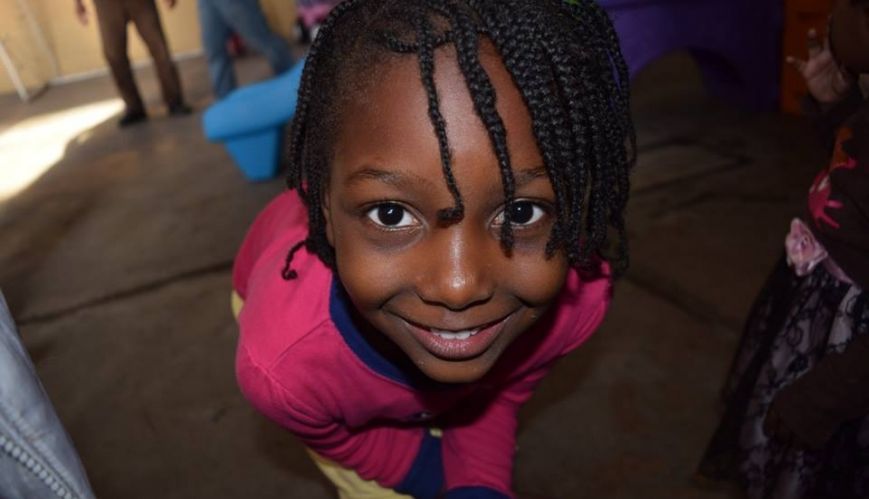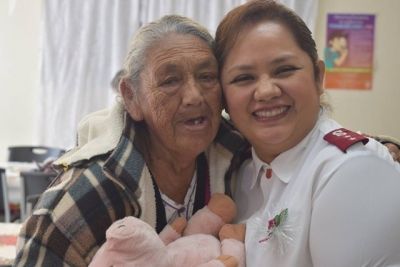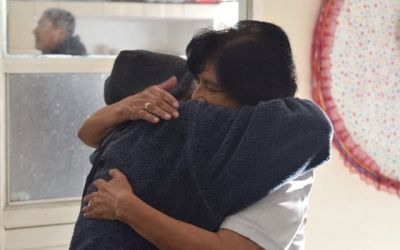Border shelter a door of hope to desperate Mexican women and children

Border shelter a door of hope to desperate Mexican women and children
Children, women and men are finding hope, safety, dignity and care at The Salvation Army's "Doors of Hope" shelter on the border of the United States and Mexio.
A Salvation Army shelter on the border of the United States and Mexico has become a haven for Mexican women and children at risk of human trafficking.
Situated in the border city of Tijuana, which is located in the Mexican state of Baja California, the shelter is called Casa Puerta de Esperanza, or “Door of Hope,” and is run by Captain Karina Olvera.
As the shelter’s program director, Captain Olvera and his team helps deportees and women from rural villages repatriate to their community of origin, or build new lives in Tijuana.
One of these women is Gabrielle.

Gabrielle’s story starts after she packed up and moved from her rural Mexican village to Tijuana to find work. It was the first step towards her dream of migrating to the US to build a life with her three children.
But those dreams were dashed when the 26-year-old found herself trapped in a forced labour situation. Working in a taqueria (a Mexican restaurant specialising in tacos and burritos) and living in the home of its owner, Gabrielle wasn’t paid what she was promised.
She was told she had to work off a debt to the business owner – and that she wasn’t allowed to return to her home village. To make matters worse, Gabrielle’s primary language was a local dialect, and her spoken and written Spanish was limited. So without fluency of the city’s dominant language, where could she turn for help?
Thankfully, she crossed paths with Captain Olvera.
Gabrielle was offered accommodation at the shelter. The facility can house six women and 18 children for up to three months at a time – offering a safe place to stay until they’re in a position to return to their families in other parts of Mexico, if they so choose.
Captain Olvera helped Gabrielle file a complaint with labour authorities, find medical help for an injury incurred while working and arrange to see a psychologist for therapy. She eventually returned to her family in her home village.

Gabrielle’s story is not unique – many marginalised women find themselves trapped and victimised in Tijuana. And existing social services in the area cover less than 20 per cent of the women and children in need of aid.
In addition to women like Gabrielle, who never make it across the border, hundreds of women and children are deported daily and released at the Tijuana Deportation Processing Centre near the Tijuana riverbed.
Because many have lived in the US for years and have no family in the area or connection to the city, they become targets for kidnapping and human trafficking. Among the most susceptible are young women aged 15-35, who often have children of their own who can also become victims.
Captain Olvera describes Casa Puerta as a way for all of them to find a level of safety and security many take for granted.
“There is no better comfort for the migrant than the warmth of a coat, the protection of a home with a clean bed and the sweet aroma of a glass of hot milk mixed with chocolate or coffee,” Olvera said. “It is easy to get all these benefits if you have somewhere to go, but this is not the case for migrants, who are exposed to kidnappings, trafficking, extortions, hunger – even to death itself.”
Committed to justice
Major Jessyca Carr is Social Services Director for The Salvation Army in San Diego, a coastal city southern California, 30km north of Tijuana, which periodically provides support for Casa Puerta. She said she was committed to the cause from the beginning, but seeing positive change in the lives of real people has been an enlightening experience.
“When we first talked about opening the shelter to prevent women and girls being drawn into human trafficking, I was committed for justice reasons,” Major Carr said. “But over the last two years I have come to know Captain Karina and her staff as well as the other officers in Baja California. I see Jesus in them. I really do. They offer compassion, grace and mercy without demanding something back.”
The Salvation Army teamed with San Diego entrepreneur Alex Zikakis in 2015 to open Casa Puerta. Zikakis realised the need for the program after visiting The Salvation Army Tijuana’s shelter for men recently deported from the US. But what program officials have found since then: the need is much broader than just Mexican nationals. In fact, people from all over the world have arrived in Tijuana over the past few years, hoping to apply for asylum in the US.
Haitians, in particular, have become increasingly eager to reach the US, after the 2010 earthquake destroyed many of Haiti’s jobs and homes, followed by Hurricane Matthew in 2016.
The US had been letting Haitians in under a humanitarian parole provision, but in response to an overwhelming influx of migrants, the Department of Homeland Security revoked that privilege – citing “sufficiently improved” conditions in Haiti. So, many Haitians travelled from South and Central America to Mexico to reach the US border only to find that they couldn’t pass through.
Instead, many have been welcomed with open arms into Mexican society. Some have even become Mexican citizens. And Casa Puerta is uniquely positioned to offer them a safe space and a helping hand until they move on to a more stable arrangement.
“This project is successfully helping a city that is strategically placed on the border of San Diego deal with people who are in a state of transition,” said Jason Pope, technical advisor for anti-human trafficking at The Salvation Army World Service Office.
“Whether they have been deported and are rebuilding their lives in Mexico or whether they are waiting for an opportunity to apply for asylum in the US, people are treated with dignity and provided care by The Salvation Army who is sharing God’s love.”
This article first appeared at newfrontierchronicle.org/tijuana-shelter-welcomes-deportees-newcomers-stalled-border